Key takeaways:
- Folklore festivals celebrate cultural heritage through music, craft demonstrations, and local cuisine, fostering connections between past and present.
- Cultural heritage enhances community identity, promotes education for younger generations, and encourages social cohesion among diverse groups.
- Engaging with locals through workshops and conversations enriches the festival experience, transforming it into a journey of personal connections and shared stories.
- Unique activities, such as storytelling circles, traditional dances, and culinary tastings, create lasting memories and deepen appreciation for cultural practices.
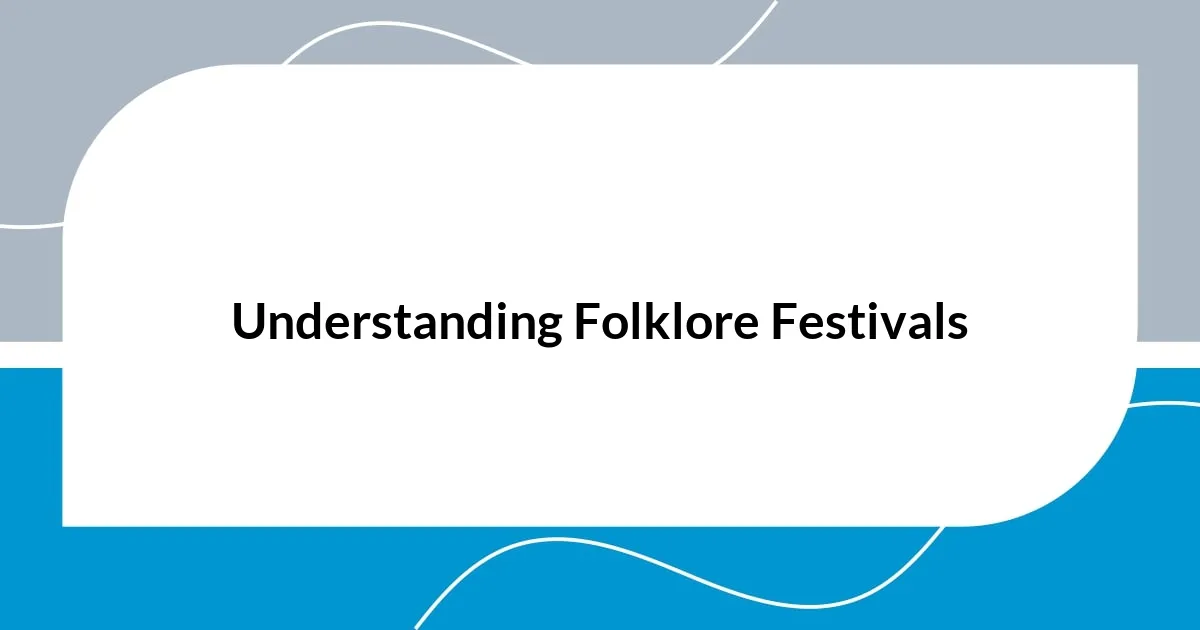
Understanding Folklore Festivals
Folklore festivals serve as vibrant celebrations of cultural heritage, allowing communities to come together and share their stories, traditions, and artistry. I remember attending a local folklore festival where the air was filled with the sweet sounds of traditional music. It struck me how music can weave narratives that resonate through generations—what stories do these melodies tell?
At these festivals, you often see craftspeople demonstrating their skills, from pottery to weaving, each piece telling a tale of its own. I was fascinated watching an artisan carve intricate designs into wood, thinking about the history behind those patterns. How many hands have shaped that wood before it became a beautiful artifact? It’s a moment of connection to the past that feels both personal and communal.
Moreover, folklore festivals often feature local foods that hold significant cultural meanings. I once tried a dish at a festival that my grandmother used to make; the taste transported me back to my childhood. Isn’t it amazing how food can invoke such powerful memories and emotions? Understanding folklore festivals is about recognizing the layers of meaning behind these customs and traditions, celebrating both individual and collective identities.
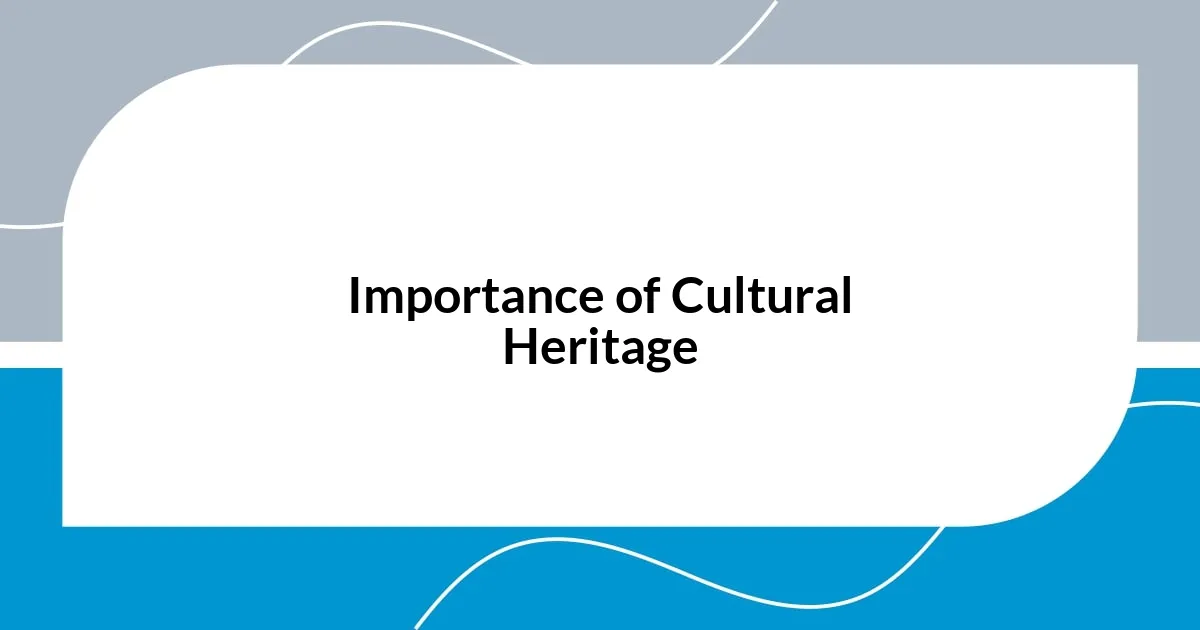
Importance of Cultural Heritage
Cultural heritage is the foundation of community identity and pride. It connects individuals to their roots, providing a sense of belonging that is often felt in the heart. I remember when my family participated in a traditional dance at a festival, and the joy of moving together to a rhythm that echoed our ancestors’ steps was electrifying. It was a profound reminder that our heritage makes us who we are.
The importance of cultural heritage also lies in its ability to educate future generations. When I take my children to folklore festivals, I see their eyes light up as they learn about crafts, stories, and traditions passed down through time. It sparks their curiosity and helps them appreciate the diversity of cultures around them. After all, what better way to foster understanding than to engage with the very essence of different communities?
Additionally, cultural heritage promotes social cohesion. When I observe people from various backgrounds coming together at these festivals, I feel a sense of unity that transcends differences. It reminds me that regardless of our individual stories, we can share in the beauty of collective traditions. Isn’t it incredible how cultural practices can create bonds among strangers and turn them into friends?
| Aspect of Cultural Heritage | Importance |
|---|---|
| Identity | Provides a sense of belonging and community connection. |
| Education | Facilitates knowledge transfer to younger generations. |
| Social Cohesion | Fosters connections among diverse groups, encouraging friendship and understanding. |
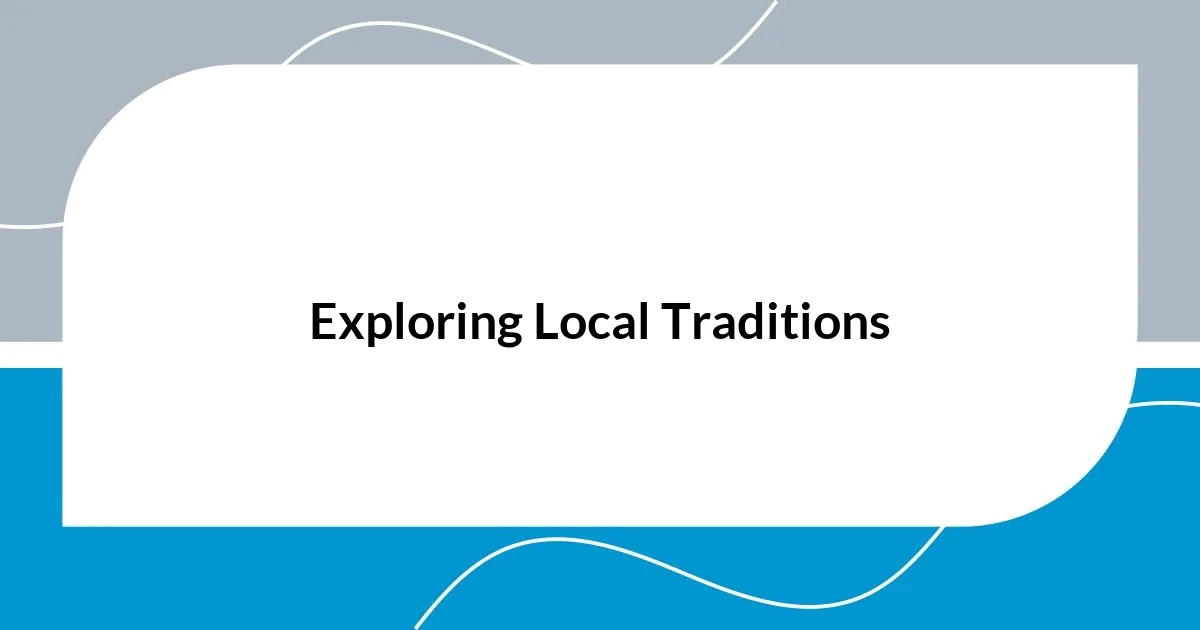
Exploring Local Traditions
Experiencing local traditions at folklore festivals opens a rich tapestry of community life. I recall a chilly autumn afternoon spent at a festival where elders gathered to share ancient tales, their voices warmed by nostalgia and laughter. The way they animated their stories made me feel like a child again, right there beside the fire, absorbing the wisdom of generations. It’s in these moments that I truly grasped how local traditions bind us together, allowing us to witness the beauty of our differences while celebrating our shared humanity.
- Traditional music echoes the collective history of a community.
- Storytelling sessions reveal cultural values, morals, and lessons.
- Artisan demonstrations showcase time-honored crafts that reflect local identity.
- Cuisine at these festivals often provides a taste of cultural heritage, enriching the experience with flavors that have been passed down through families.
Each of these elements offers a deeper understanding of the community and creates connections that linger long after the festival ends.
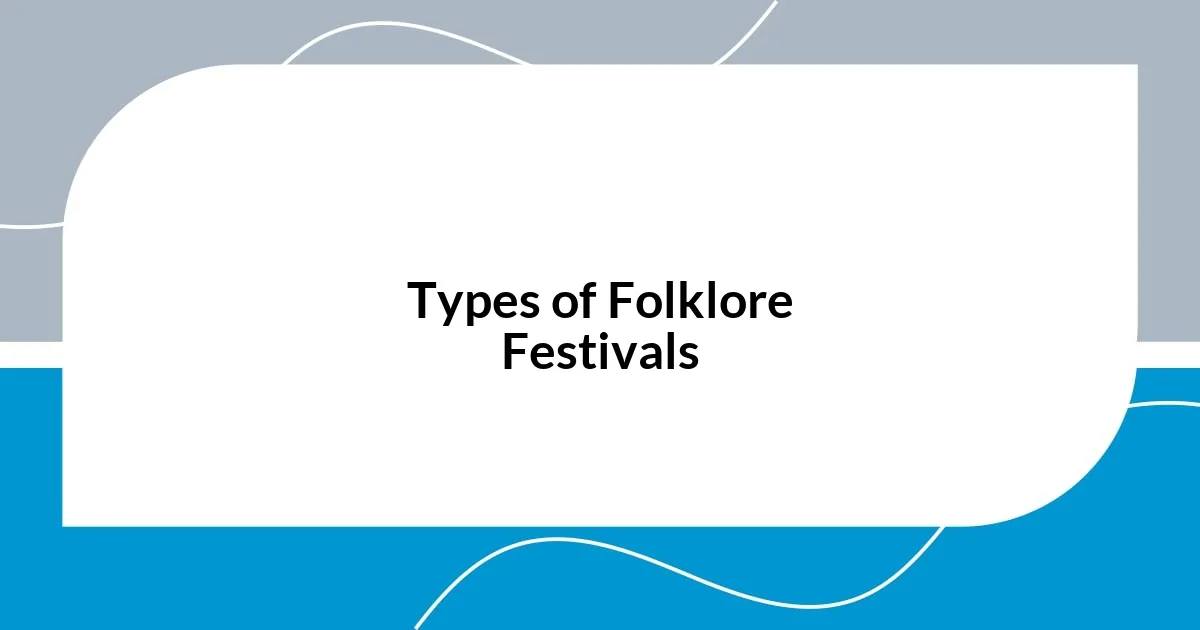
Types of Folklore Festivals
Folklore festivals can be categorized into various types, each offering a unique glimpse into the cultural fabric of a community. For instance, seasonal festivals often celebrate harvests or solstices, connecting us with the rhythms of nature. I remember attending a harvest festival where pumpkins adorned every corner, and the excitement of children running through corn mazes brought back joyful memories of my own childhood.
There are also storytelling festivals, which focus on preserving oral traditions and sharing tales that often contain deep moral lessons. What I find so captivating about these gatherings is how each story transports us to another time and place, igniting our imagination. Last year, I sat enraptured as a storyteller recounted tales of bravery and love; it felt as if the words wove a spell around the audience, uniting us in shared wonder.
Another type of folklore festival celebrates specific cultural practices, such as music or dance. My heart raced as I watched a vibrant dance performance that showcased both skill and passion, often echoing the turmoil and joy of a community’s history. These performances serve not only as entertainment but also as a reminder of resilience. They provoke questions like, “How do these rhythms express our struggles and triumphs?” And the answer lies in the spirit of the dancers, as they channel generations of experience into every movement.

Planning Your Festival Experience
When planning your festival experience, consider your priorities. Are you drawn to immersive storytelling, vibrant performances, or the tantalizing tastes of local cuisines? The first time I attended a folklore festival, I was overwhelmed by choices and nearly missed out on a mesmerizing dance that still resonates with me.
It’s smart to create a schedule that balances activities with downtime. I learned this the hard way during a whirlwind festival weekend; after rushing from one event to another, I found myself too exhausted to enjoy the finale. Allowing for a moment of reflection or leisurely exploration can reveal hidden gems. Have you ever stumbled upon an unexpected artisan booth that left you in awe? I certainly have, and it often becomes the highlight of my visit.
Lastly, don’t forget to connect with fellow festival-goers. Sharing thoughts and experiences can enhance understanding and energy. I remember chatting with a local elder who shared stories about her family’s role in preserving certain traditions—just being there felt like a gift. It’s these interactions that turn a festival into a personal journey, one that stays with you long after the last performance ends.

Tips for Engaging with Locals
Engaging with locals at folklore festivals can transform your experience from ordinary to extraordinary. One of my favorite ways to connect is by participating in community workshops. I once attended a pottery-making session, and the local artisan shared not just techniques but also stories about the significance of the craft in her family. It was in those moments that I felt my understanding of the culture deepen, as each piece of pottery held memories of the past.
Don’t underestimate the power of simple conversation. I vividly recall sitting on a bench, watching a lively performance, when I struck up a chat with a couple next to me. They enthusiastically shared insights about the festival’s history, along with their personal experiences. Their stories added layers to the performances, making me feel even more connected to the unfolding narrative. Have you ever realized that a friendly exchange could turn a fleeting moment into a cherished memory? It’s those little dialogues that often make festivals memorable.
Finally, be open to spontaneous invitations. I once found myself following a group of local dancers into an impromptu jam session, where I was welcomed with open arms. It felt exhilarating to join in, moving to rhythms I had never danced to before. Those kinds of experiences remind us of our shared humanity and the joy of connection. Isn’t it amazing how a festival can become a nurturing ground for friendships that might last well beyond the event?
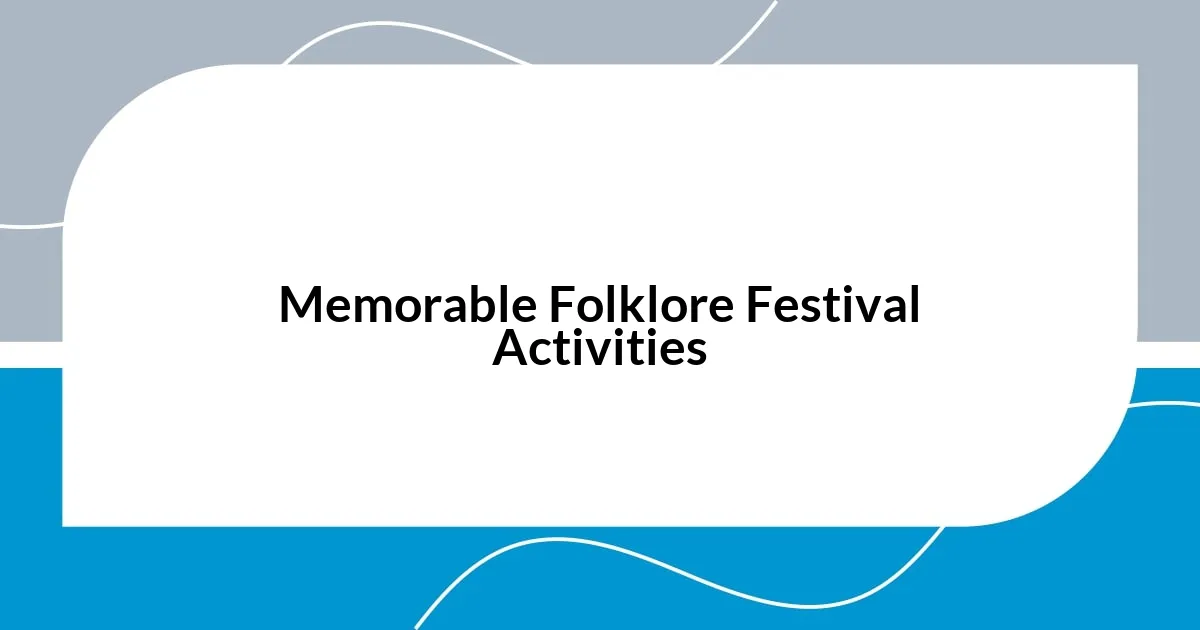
Memorable Folklore Festival Activities
Memorable folklore festivals are often defined by their unique activities that leave lasting impressions. I recall a storytelling circle I joined, where participants shared tales under the stars. The warmth of the fire and the cadence of voices transported me, igniting my imagination. Have you ever felt deeply connected to a story that seemed to echo your own life experiences? Those moments are truly magical.
Another unforgettable experience for me was taking part in a traditional dance. As the vibrant music enveloped the crowd, I hesitated but was gently coaxed onto the dance floor by some locals. I found myself immersed in a world where the rhythm was a language, and every step felt like a conversation with the past. I wondered then, how many stories the dance floor had witnessed over generations.
Finally, the culinary tastings at folklore festivals are simply delightful. I still remember the first time I tasted homemade tamales prepared by an elderly woman who shared the origins of each ingredient. Her passion was contagious, and it transformed a simple meal into a profound connection to the culture. Have you ever savored a dish that told a story of tradition and heritage? Experiences like that linger in memory long after the taste has faded.